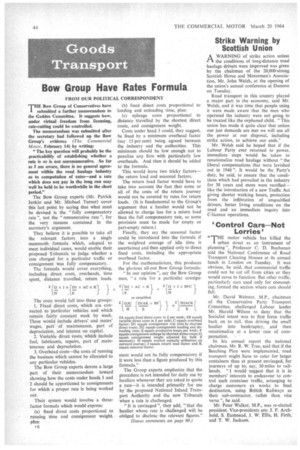Strike Warning by Scottish Union
Page 46

If you've noticed an error in this article please click here to report it so we can fix it.
.1-1 A WARNING of strike action unless
the conditions of long-distance road haulage drivers were improved was given by the chairman of the 20,000-strong Scottish Horse and Motormen's Association, Mr. John Welsh, at the opening of the union's annual conference at Dunoon on Tuesday.
Road transport in this country played a major part in the economy, said Mr. Welsh, and it was time that people using it were made aware that the men who operated the industry were not going to be treated like the orphaned child. "This union has made it quite clear that unless our just demands are met we will use all the power at our disposal, including strike action, to achieve our ends."
Mr. Welsh said he hoped that if the Labour Party ever returned to power, immediate steps would be taken to renationalize road haulage without "the liberal compensations that were lavished out in 1948 ". It would be the Party's duty, he said, to ensure that the conditions which had prevailed in the industry for 30 years and more were rectified— like the introduction of a new Traffic Act giving shorter working hours, protection from the infiltration of unqualified drivers, better living conditions on the road and an immediate inquiry into C-licence operations.
Control Cars—Not Lorries'
HE motor vehicle has killed the 1 urban street as an instrument of planning ", Professor C. D. Buchanan told the National Conference of Road Transport Clearing Houses at its annual lunch in London on Tuesday. It was obvious, he said, that commercial traffic could not be cut off from cities or they would cease to function. But other traffic, particularly cars used only for commuting, formed the section where cuts should fall.
Mr. David Webster, M.P., chairman of the Conservative Party Transport Committee, challenged Labour leader Mr. Harold Wilson to deny that the Socialist intent was to first force traffic back on to rail. thus driving the small haulier into bankruptcy, and then renationalize at a lower rate of compensation.
In his annual report the national chairman, Mr. R. W. Tree, said that if the Beeching Plan were implemented, road transport might have to cater for larger containers than at present envisaged, for journeys of up to, say, 30 miles to railheads. "I would suggest that it is in members' interests to endeavour to control such container traffic, arranging to charge customers ex works to final destination, using British Railways as their sub-contractor, rather than vice versa ", he said.
Mr. Peter Walker, M.P., was re-elected president. Vice-presidents are: J. F. Archbold, S. Eastmead, S. W. Ellis, H. Firth, and T. W. Jackson.
















































































































































